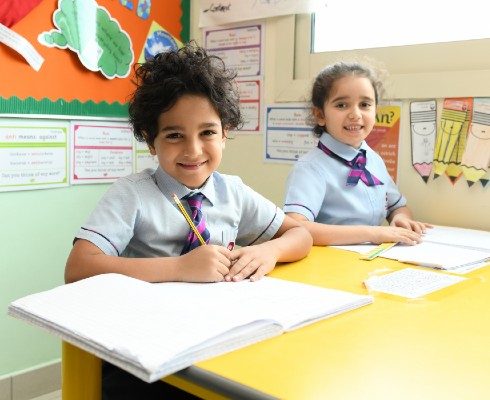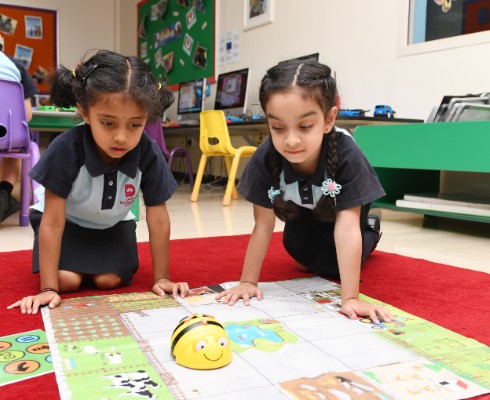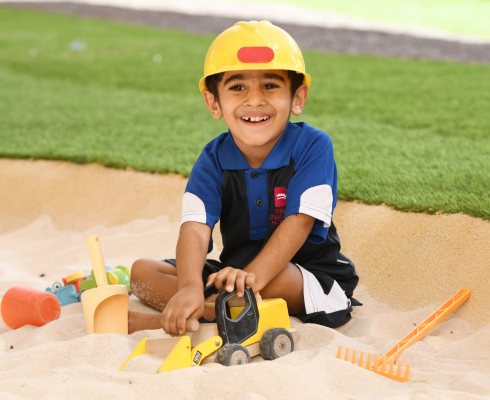Primary school at GRDS
Primary
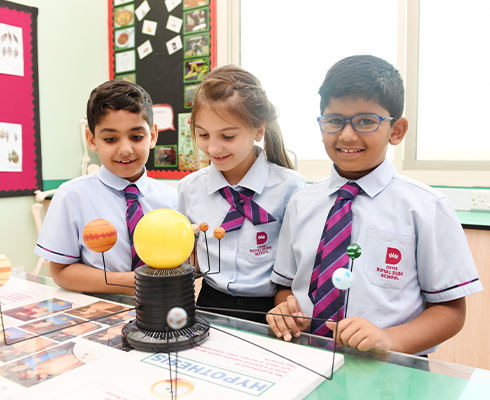
GEMS Royal Dubai School offers a world-class education based on the National Curriculum for England (NCfE) England. The NCfE places emphasis on depth and breadth of learning through a mastery approach, whilst developing the personal, social, emotional and physical needs of the whole child.

WELCOME TO THE PRIMARY SCHOOL
Our Primary School provides an inspiring and engaging learning environment, where every child is known and valued. We are a family feel school with children at the heart of everything we do, ensuring there is a strong balance between academic learning and sports, creative arts and languages. As a High Performance Learning world class school, we believe that every child can be a high performer and it is our role to foster lifelong learning skills through challenge, innovation and real life experiences. We understand the importance of working together with the whole family, building positive and supportive relationships always motivated by our school vision of Achieving Excellence Together.
Primary Curriculum Overview
By personalising learning for every child we can identify and foster talents, and support individual needs, ensuring that every child who graduates from GEMS Royal Dubai School is future- ready and a high performing learner.
Assessments
-
Aims
The school assessment principles aim to give reliable information to parents and pupils which:
- Allows meaningful tracking of pupils towards end of key stage expectations, including regular and easily understood feedback to parents which is transferable to any school following the Curriculum for England.
- Produces recordable measures which can demonstrate comparison against expected standards and reflect progress over time.
- Recognises and gives early support and guidance to those who are falling behind and those who are excelling.
- Ensures that feedback to pupils contributes to improved learning and is focused on specific and tangible objectives.
- Demonstrates that the school is keeping up with external best practice and innovation.
-
Quality Assessment
Pupils should have an understanding of where they are going in their learning and the standards they are aiming for. The expectation therefore is that teachers will share learning objectives, outcomes and success criteria with pupils. Pupils should first know what high quality learning looks like in a particular area. Providing exemplars and scaffolding (verbal and physical) can encourage this dialogue and enable them to respond to the questions:
- “What are you learning in this lesson?"
- “How are you learning?”
- “How will you know you have been successful?” (WAGOLL – What a good one looks like!)
Lessons are planned with clear learning questions or objectives and expected learning outcomes through clear success criteria with individual abilities of children within the class being considered. Learning questions are similar to learning objectives whereby they are SMART (specific, measurable, achievable, realistic, and targeted), displayed daily for each lesson taking place and shared with the pupils at the onset or during the lesson. The learning objective or learning questions are written or typed onto each piece of work. The success criteria, again in the SMART format and created with the children whenever possible, enable students to know what they need to do to achieve the objective set in the lesson and enable them to be successful and this must be accessible for the students throughout the lesson. (e.g. displayed on monitor or use of a rubric). Feedback reflects the learning objective or question using appropriate success criteria identified in the planning.
-
Target Setting
Specific targets (through 2 simple and learning ladders) are set for all children within the subject areas of English, Mathematics, Science, Arabic and Islamic. These are regularly monitored, reviewed and communicated to children, parents and support teachers where necessary. Targets may also be set for within other areas of the curriculum to enhance learning and aid progression.
-
Summative Assessments
In line with the assessment expectations of the English curriculum students are assessed at different points throughout their educational journey.
At the end of Year 1 students participate in a phonic screening check, which aims to ensure that all children have learned phonic decoding to an age-appropriate standard. Children who have not reached this level will receive extra support to ensure they can improve their decoding skills and will then retake the phonics screening check in Year 2.
At the end of KS1 (Year 2) students take National tests and teacher assessment in English and Mathematics. At the end of KS2 (Year 6) students take National tests and teacher assessment in English and Mathematics.
In addition to the mandatory assessments set by the National Curriculum students at GRDS in Year 2 – 6 participate in end of year GL Progress tests in Mathematics and English. Year 3-6 students also sit the Science GL Progress tests at the end of each year. This measures their progress from year to year and their attainment against curriculum expectations. Year 3 – 6 also sit a CAT4 assessment at the beginning of each academic year.
CAT 4 provides a rounded profile of student ability so you can target support, provide the right level of challenge and make informed decisions about students’ progress. It provides a unique profile of strengths and weaknesses across four batteries:
Verbal Reasoning – the ability to express ideas and reason through words is essential to subjects with a high language content, and the most obvious skill picked up by traditional assessment.
Non-verbal Reasoning – problem-solving using pictures and diagrams; skills which are important in a wide range of school subjects, including maths and science-based subjects.
Spatial Reasoning – the capacity to think and draw conclusions in three dimensions, needed for many STEM subjects, but not easily measured by other datasets.
Quantitative Reasoning – the ability to use numerical skills to solve problems, applicable well beyond mathematics.” (GL Assessment website)As a school we analyze the results of the yearly progress tests with the results of CAT4 to support students reaching their full potential and identify and provide strategies for any barriers to learning and create a learner profile for each students and their specific needs.
Additional internal assessments are carried out throughout the year to assess progress and attainment in the core areas of learning.
-
Formative Assessments (Day to day)
Day to assessments made by the class teacher are ongoing and a form an important part of triangulating attainment and progress for individual students. This type of assessment comes in many forms. For example:
- Questions and answers during class
- Dialogue between teacher and pupil
- Marking of pupils’ work
- Observations
- Regular short re-cap quizzes
- Scanning work for pupils’ attainment and development
Learning Ladders
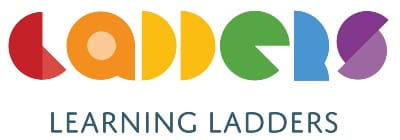
Teachers and parents work in partnership to support your child’s progress using Learning Ladders. It is an online tool we use to track students’ progress against curriculum objectives. At the click of a button, teachers can assess pupil progress against a series of 'I can' statements that represent the skills and knowledge planned in our curriculum.
Students have targets and have access to their learning ladders to see how they are progressing and what they need to focus on next. Learning Ladders data is shared with families within their school reports and we provide parents with access to Learning Ladders at home. “Ladders at Home enables you to view your child's curriculum alongside a bank of teacher written resources which break down the curriculum, helping you to help your child at home.” This tool is also available in multiple languages to support parents for whom English is an additional language.
A bespoke tool created at GEMS Royal Dubai School is now used across UAE schools to support academic progress in Arabic & Islamic with clear tracking of Ministry of Education curriculum throughout your child’s learning journey.
Attainment
- GEMS Royal Dubai School uses the descriptors of Beginning (B) Working Towards (WT), Working Within (WW), Working Above (WA)
- The curriculum is age-related and is linked directly to the curriculum objectives based on the NCfE
- Arabic and Islamic lessons follow the MOE objectives, which are also included in the Learning Ladders tool and the same bandings are applied for attainment
- Learning objectives are set out in the Learning Ladders assessment system used by teaching staff
Progress
- GEMS Royal Dubai School uses the descriptors of Below Expected level, At Expected level, Above Expected Level
- Progress is calculated cumulatively across the year based on objectives taught. These may be below age related curriculum expectations depending on a student's starting point
Subject Areas
Students at GEMS Royal Dubai School follow an enriched version of the New National Curriculum for England where they may transfer to or from other National Curriculum schools around the world. The school is a COBIS member and support students wanting to transition between the UK and UAE.
-
Core Subjects
The Core Subjects are the basis for all other learning and are more formally assessed each year.
English
The National Curriculum for English develops student’s understanding of the English language. Children develop skills around the four areas: Speaking, Listening, Reading and Writing. In KS1, children will develop a deep understanding of Phonics before applying these in the four areas.
Maths
The National Curriculum for Mathematics develops a broad range of skills encouraging children not just to become fluent with mathematical strategies but to reason mathematically and solve problems. Mathematics is broken down into the following topics: Place Value; Number; Calculations; Shape and Space; Measurement; Data Handling; and Algebra.
Science
The National Curriculum for Science aims to ensure that all students develop scientific knowledge and conceptual understanding through the specific disciplines of biology, chemistry, and physics. Students will also develop understanding of the nature, processes, and methods of science through different types of science inquiry that help them to answer scientific questions about the world around them. Lessons ensure all children are equipped with the scientific knowledge required to understand the uses and implications of science, today and for the future.
Arabic A (specialist)
Our specialist Native Arabic curriculum mirrors our English curriculum, and, from a young age, children develop skills around the four areas: Speaking, Listening, Reading and Writing. Children attend Arabic A specialist lessons four to five times a week, depending on the age of the child.
Arabic B (specialist)
Our specialist Arabic curriculum mirrors our Modern Foreign Language curriculum, and, from a young age, children develop skills around the four areas: Speaking, Listening, Reading and Writing. Children attend Arabic B specialist lessons three to four times a week, depending on the age of the child.
Islamic (specialist)
For our Muslim students, our specialist Islamic curriculum provides children with an opportunity to develop their understanding of Islamic values. Muslim children attend Islamic lessons two to three times a week, depending on the age of the child.
Social Studies
Children will access the Social Studies UAE Ministry of Education Curriculum, which is related to the building of personalities, instilling the values of national identity, the practice of good citizenship, which, in turn, develops a sense of belonging within the school and local community.
-
Foundation Subjects
Connected Curriculum
The Connected Curriculum ensures Foundation Subjects are delivered in a connected and thematic way in order to provide exciting, engaging and motivating learning opportunities.
Each Learning Journey has one or two key projects which offer opportunities to ‘get under the skin’ of the skills and deepen understanding of that subject area. For example, when exploring the Key Question: What does it mean to be a hero? Year 5 students discover Ancient Greece in History and Modern Greece in Geography to innovate the modern-day Olympics in Design and Technology.
Connections between subjects are clearly mapped, whilst providing adaptability and flexibility so that the lives and cultures of learners and their communities can be distinctively embedded. Importantly, the Connected Curriculum ensures a balance of thematic and discrete teaching with an emphasis on both knowledge and skills. Connected Curriculum includes the following subjects:
Geography
The Academy's Geography education inspires pupils’ curiosity and fascination of the world and its people. Teaching equips pupils with knowledge about diverse places, people, resources and natural and human environments, together with a deep understanding of the Earth’s key physical and human processes. Geographical knowledge, understanding and skills provide the frameworks and approaches that explain how the Earth’s features at different scales are shaped, interconnected and change over time.
History
Our History education helps children gain a coherent knowledge and understanding of Britain’s past and that of the wider world. Teachers inspire pupils’ curiosity to know more about the past. Teaching equips pupils to ask perceptive questions, think critically, weigh evidence, sift arguments, and develop perspective and judgement. Our lessons help pupils understand the complexity of people’s lives, the process of change, the diversity of societies and relationships between different groups, as well as developing their own identity and identifying challenges of their time.
Design and Technology
Our Design and Technology Curriculum allows children to use their creativity and imagination to design and make products that solve real and relevant problems within a variety of contexts, considering their own and others’ needs, wants and values. Pupils learn how to take risks, becoming resourceful, innovative, enterprising and capable citizens. Through the evaluation of past and present design and technology, they develop a critical understanding of its impact on daily life and the wider world.
Art and Design
Art, Craft and Design has the power to expand our cultural awareness, increase our ability to problem solve, cultivate our fine motor skills and aid us in producing a range of opinions and views on our world. Young or old, these are skills we use each and every day as tools to navigate our way around our visually complex world. At RDS, we strive to create an Art Curriculum that has these key skills at its heart whilst also engaging, inspiring and challenging pupils to equip them with the knowledge and skills to experiment, invent and create their own personal masterpieces. As pupils progress, they will be able to think critically and develop a more rigorous understanding of Art and Design. They will appreciate how Art and Design both reflects and shapes our history, and contributes to the culture, creativity and wealth of our nation and the wider world.Computing
Computing equips our students to use computational thinking and creativity to understand and change the world. Computing has deep links with mathematics, science and design and technology, and provides insights into both natural and artificial systems. The core of computing is computer science, in which pupils are taught the principles of information and computation, how digital systems work and how to put this knowledge to use through programming. Building on this knowledge and understanding, pupils are equipped to use information technology safely to create programs, systems and a range of content. Computing also ensures that pupils become digitally literate – able to use, and express themselves and develop their ideas through, information and communication technology – at a level suitable for the future workplace and as active participants in a digital world.
Moral Education
The UAE Ministry of Education Moral Education Curriculum is divided into four core areas:
- The Character and Morality curriculum is centred around developing each student as honest, tolerant, resilient and persevering individuals.
- The Individual and the Community curriculum ensures that children understand a true citizen is one that takes care of themselves in addition to caring about the good of society and participating actively to make things better.
- Civil Studies ensures that whether a student was born in the UAE or moved here with their family, it is essential to understand the fundamentals of how the UAE was formed and how it is governed today.
- Culture is an inherent part of a society and the programme wants to highlight UAE’s shared human culture that encapsulates the traditions and symbols that help define who we are.
Physical Education (specialist)
The Academy’s high-quality physical education curriculum inspires all pupils to succeed and excel in competitive sport and other physically demanding activities. It provides opportunities for pupils to become physically confident in a way which supports their health and fitness. Opportunities to compete in sport and other activities build character and help to embed values such as fairness and respect. Our state-of-the art PE facilities enrich the curriculum for students from FS1 to Secondary.
Music (specialist)
Our specialist Music lessons provide an opportunity to develop a universal language that embodies one of the highest forms of creativity. The high-quality music education at WEK should engage and inspire pupils to develop a love of music and their talent as musicians, and so increase their self-confidence, creativity and sense of achievement. As pupils progress, they should develop a critical engagement with music, allowing them to compose, and to listen with discrimination to the best in the musical canon.
French (specialist)
Weekly specialist French lessons provide an opening to other cultures. Our high-quality language education fosters children’s curiosity and deepens their understanding of French speaking cultures. Our teachers enable pupils to express their ideas and thoughts in the French language while providing opportunities for them to communicate for practical purposes. The Primary Modern Foreign Languages (MFL) Curriculum is broken down into the following areas: Speaking, Listening, Reading and Writing.
More To Explore
-
Curriculum Overview
GEMS Royal Dubai School offers an enriched version of the New National Curriculum for England.
-
Foundation Stage
GEMS Royal Dubai school is an outstanding school with an experienced team of Early Years practitioners.
-
Learning Skills
The development of learning skills through High Performance Learning (HPL) is fundamental to how our children learn at RDS.






